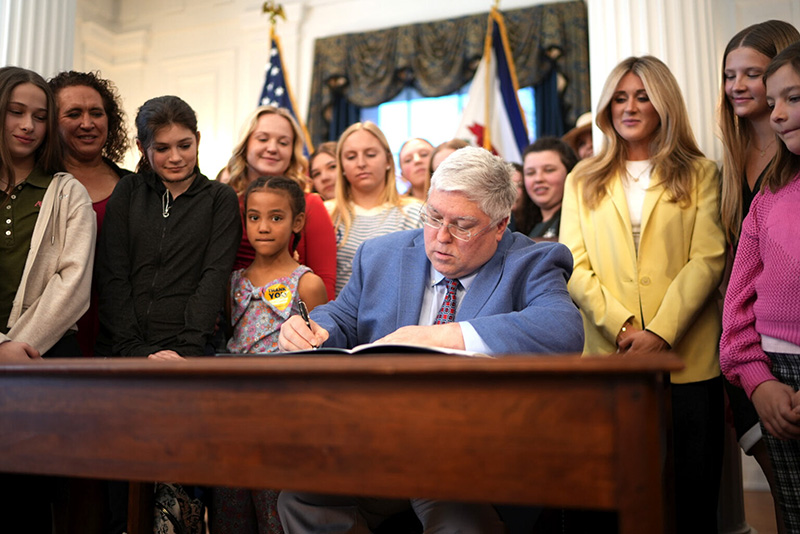2016: The Year in Review
From the tragic shooting at Pulse to the tragic election of President Donald Trump, we take stock of the year just ended

For the LGBT community, 2016 marks the end of a brief honeymoon period in our history, when progress on equality seemed all but inevitable. The past eight years of the Obama administration have left the LGBT community relatively spoiled, enjoying major victories like the repeal of “Don’t Ask, Don’t Tell” and the legalization of marriage equality.
2016 changed everything. From the enactment of anti-LGBT legislation to the massacre of 49 people in Orlando’s Pulse nightclub, it has certainly not been a year to remember. And that’s before you consider Brexit, the election of Trump, the onslaught of ISIS, and the atrocities in Syria.
The sentiment is widespread that this year has been one of the worst in recent memories. Last Week Tonight’s John Oliver told 2016 “Fuck You,” BuzzFeed called the year “shitty,” and Slate magazine even ran a headline asking: “Is 2016 the worst year in history?”
Despair and frustration can be powerful forces to overcome. But 2017 offers the LGBT community a chance to rebound and refocus our efforts on the things we’ve neglected. Now, perhaps more than ever, is the time to fight back against any erosion of our rights. But first let us remember the horrible year that was — the victories and defeats, the highs and lows, the gains and losses — and resolve to make 2017 that bit less awful.
JANUARY
2016 started as it meant to go on: in abject misery. ISIS’s rampage in Syria and Iraq continued to claim countless lives, including dozens of LGBT people — particularly young men suspected of being gay. Tried in farcical courts, ISIS’ victims were thrown from buildings, stoned to death, shot in the head, or sometimes a combination of those atrocities. At least two of the victims were under the age of 18, and ISIS shows no signs of relaxing its barbaric attitudes towards homosexuality any time soon.
Back home, the presidential primary was offering scarce respite for the LGBT community, as business mogul Donald Trump emerged from a field of 17 — many of whom harbored anti-LGBT attitudes. At the time, Trump was considered the least awful GOP candidate for LGBT rights, something that would later prove wishful thinking.

Alabama Chief Supreme Court Justice Roy Moore came crawling back out of the woodwork at the start of the year, with the notoriously homophobic judge telling probate judges in the state to ignore the U.S. Supreme Court’s June 2015 decision on marriage equality. Thankfully, it would finally prove a bigoted step too far, something Moore learned later in 2016.
In more positive news, the Furies House — the site of a lesbian collective in Southeast D.C. — made history by becoming the first lesbian-specific D.C. Historic Landmark. It would later become one of 10 LGBT sites listed on the National Register of Historic Places.
D.C.’s leather enthusiasts rejoiced in January, when Arlington resident Todd Leavitt was named Mr. MAL at the annual Mid-Atlantic Leather Weekend. It was a feel-good story for Leavitt, who won Mr. Detroit Leather in 1991 but was forced to give it up to become an Army physician at Walter Reed Army Medical Center — at a time when being openly gay was still grounds for dismissal.
FEBRUARY

The death of anti-LGBT Supreme Court Justice Antonin Scalia caused one of the year’s most contentious fights, as Republicans threatened to block President Barack Obama’s attempts to name a replacement. Scalia opposed marriage equality and considered gay people as “reprehensible” as “murder, for example, or polygamy, or cruelty to animals.” Any Obama-approved replacement would likely have been more open to LGBT rights.
February also brought a flurry of anti-LGBT legislation in various states. Some dealt with so-called “religious freedom” objections, allowing businesses and individuals to refuse service to LGBT people. Other legislation attempted to allow government officials to refuse marriage licenses to same-sex couples. And others targeted the transgender community by relegating trans people to using only those bathroom or locker room facilities of their assigned sex at birth.
Countering the wave of legislative hate, Charlotte, N.C., passed an ordinance that protected LGBT people from discrimination in housing, employment and public accommodations. In Kentucky, the infamous Rowan County Clerk Kim Davis gave up her fight against same-sex marriage and retreated back into bigoted obscurity, after Gov. Matt Bevin changed the law to remove county clerks’ names from marriage licenses. In New York, Gov. Andrew Cuomo banned insurers from covering “ex-gay” conversion therapy, and in D.C the City Council passed a bill mandating that health care professionals receive cultural competency training on how to best deal with LGBT patients.
MARCH
The LGBT community received a boost from two unlikely sources: Gov. Dennis Daugaard of South Dakota, who vetoed an anti-transgender “bathroom bill,” and Gov. Nathan Deal, of Georgia, who vetoed a “religious freedom” bill. In Iowa, the Democratic-controlled Senate passed a bill to include protections for transgender individuals under the state’s hate crimes statute. And in Mississippi, a longtime ban prohibiting same-sex couples from adopting was ruled unconstitutional.

However, one of the biggest setbacks for the LGBT community this year came from North Carolina. Republicans, furious that Charlotte City Council had attempted to protect LGBT people from discrimination, called a special session to jam through the now infamous HB 2. It overturned pro-LGBT nondiscrimination ordinances and forced transgender people to use bathrooms based on their assigned sex at birth. The extent and animosity of the bill led to a backlash from pro-equality municipalities across the country, with many banning state-sponsored travel to North Carolina.
APRIL
The firestorm surrounding HB 2 continued to rage. The state was heavily criticized by the business and entertainment communities, with many choosing to boycott the state — PayPal, for instance, cancelled plans to build a global operations center in North Carolina. In a desperate attempt to placate businesses, Gov. Pat McCrory signed a nondiscrimination order aimed at protecting LGBT people. But it contained significant religious exemptions, meaning in reality it changed absolutely nothing.
There was more negative news, as Tennessee Gov. Bill Haslam signed a bill that allows therapists and counselors to refuse to treat LGBT people and others whose “lifestyle” the therapist or counselor finds objectionable — a stunningly ignorant move that could leave vulnerable LGBT people open to harm. But Haslam wasn’t alone in his tone-deaf support of bigotry. Defying warnings from the business community in his state, Mississippi Gov. Phil Bryant proudly signed yet another “religious freedom” bill, legalizing discrimination against the LGBT community.

Locally, D.C.’s transgender community lost one of its own after Keyonna Blakeney was murdered in a hotel room in Rockville. Blakeney became the latest name in a worryingly long list of transgender women of color in the United States who have been violently killed in recent years.
In response to HB 2, retail giant Target reached out to the transgender community by adopting a policy allowing trans customers to use whichever restroom they feel most comfortable with — a show of support that infuriated anti-LGBT groups.

Perhaps most significantly for the transgender community, the 4th U.S. Circuit Court of Appeals issued a groundbreaking ruling in Virginia. It found that Title IX’s protections against sex discrimination apply to students who are discriminated against on the basis of their gender identity. The decision handed Gavin Grimm — a trans Gloucester County, Va., student — a victory over his local school board, which has tried for almost two years to ban him from the boys’ restroom.
MAY
In May, Congress fought over LGBT rights when Oklahoma U.S. Rep. Steve Russell successfully added an amendment to a bill that invalidated an Obama executive order banning LGBT discrimination by companies that receive government contracts. LGBT advocates, led by U.S. Rep Sean Patrick Maloney of New York, attempted to add an amendment to another bill that would overrule Russell. It got enough Republican votes to pass, but party leaders later defeated the bill — because heaven forbid the GOP protect LGBT people from discrimination.
The month wasn’t a total loss: The U.S. Department of Education and Department of Justice issued revolutionary guidance to schools asking them to treat transgender students according to their gender identity, and the state of Vermont took steps to ban the practice of conversion therapy on minors.

May also offered a history-making moment for the LGBT community, when Eric Fanning was confirmed as Secretary of the Army, becoming the first openly gay person to lead a branch of the U.S. military.
JUNE
As if legislative assault wasn’t enough, 2016 brought a tragedy that struck at the heart of the American LGBT community. June, officially Pride month, is supposed to be 30 days of celebration and affirmation of the love and support within the LGBT community. Instead, it became a test of the strength of those bonds. In the early hours of June 12, a lone gunman walked into Pulse — an LGBT nightclub in Orlando — and opened fire, murdering 49 people and injuring a further 53. Families were destroyed, relationships shattered, young lives cut short in a senseless act of hatred.

In the wake of tragedy came an outpouring of love. Across the country — and, eventually, the world — LGBT communities gathered to mourn, to show support, and to commit to fighting the very anger that had fueled one man to murder dozens of LGBT people. Activists turned their attention to lax gun laws, homophobes were temporarily silenced, and for a brief moment LGBT Americans were reminded of just how far our movement has come — and how far it still has to go. The worst mass shooting in modern American history had deeply wounded the community, but we recovered, we remembered, and we renewed our commitment to keep fighting for our rights.
Later that month, President Obama made history by designating the historic Stonewall Inn — considered by some to be the birthplace of the modern LGBT rights movement — the first national monument dedicated to LGBT history. It was a powerful counterpoint to the tragedy that had occurred almost two weeks earlier.
JULY
July began with a significant announcement from Defense Secretary Ashton Carter: The U.S. military would begin allowing transgender service members to serve openly.
Unfortunately, that news was countered by Donald Trump picking notoriously anti-LGBT Indiana Gov. Mike Pence to be his running mate. Any thought that Trump would temper Republican attitudes towards LGBT rights was further shattered at the Republican National Convention, where attendees approved “the most anti-LGBT platform in the Party’s 162-year history,” according to Log Cabin President Gregory T. Angelo.

In contrast, Democrats bent over backwards to appeal to the LGBT community at their convention, featuring major LGBT elected officials, the approval of a pro-LGBT platform, and speakers including Jason Collins, Christine Leinonen — the mother of Pulse victim Drew Leinonen — and HRC’s Sarah McBride, who became the first openly transgender person to address a national convention.
AUGUST

The biggest headline grabber in August was the Rio 2016 Olympics, which was constantly mired in controversy. While 43 athletes openly identified as LGBT — the largest number of any Olympics — The Daily Beast enraged many when a reporter wrote about gay athletes on Grindr in the Olympic Village. In its original edit, it threatened to out athletes by listing their sport and country of origin — easily identifiable information that placed some at risk in their home nations. Daily Beast editors tried to fix the story, but the criticism was so great that they took the unprecedented step of deleting it and posting an editorial apology.
Donald Trump, smarting from Hillary Clinton’s commanding lead in the polls, appeared to have a split personality over LGBT rights. On one hand, he proposed a “test” for new immigrants from places with a history of terrorism or Islamic extremism, including questions about their support for gay rights. He also blasted Clinton for the Clinton Foundation’s decision to accept money from anti-LGBT regimes in the Middle East. But at the same time, Trump, along with Sen. Marco Rubio, was accused of hypocrisy after he appeared at a conference of anti-LGBT activists in Orlando, just a short drive from the site of the Pulse nightclub massacre.
In a blow to the Obama administration, Reed O’Connor, a federal judge in Texas, blocked their guidance on the treatment of transgender students, arguing that they did not follow proper procedures.
SEPTEMBER
The hits just kept coming for North Carolina in the fall, as the NCAA decided to pull several sports championships from the state. The fallout was a major blow to Republicans, who campaigned on their support for HB 2.
In another small victory for transgender individuals, Housing and Urban Development Secretary Julian Castro approved a rule that requires homeless shelters accepting federal funds to house people based on their gender identity.

Former Private Chelsea Manning, the transgender woman behind one of the largest leaks of classified information in military history, went on a hunger strike to protest the Department of Defense’s refusal to treat her according to her gender identity. Manning was later promised gender confirmation surgery.
Eight months after trying to defy the Supreme Court, Alabama Chief Justice Roy Moore finally got his comeuppance. The Court of the Judiciary said that Moore had attempted to undermine the U.S. Supreme Court’s decision legalizing marriage equality. Moore was formally suspended without pay for the remainder of his six-year term (ending in 2019). The schadenfreude was strong.
In a blow to LGBT media, popular lesbian website AfterEllen.com shut down. Editor-in-chief Trish Bendix urged readers to find other sites dedicated to queer women and financially support them, saying: “Queer women are worthy.”
OCTOBER
California Gov. Jerry Brown signed a bill for all public accommodations with single-user restrooms to be accessible to all genders, giving California the most pro-transgender bathroom laws in the country. In Florida, a judge ruled in favor of a transgender teen whose parents requested that the state change his birth certificate to correctly reflect his gender identity.
In more good news, the U.S. Supreme Court agreed to take up the case of Gavin Grimm, making a determination next spring of whether transgender discrimination is, in fact, sex discrimination.

At the national level, Clinton was en route to a historic win, riding high in the polls after Trump was heard bragging about sexually assaulting women in a tape from 2005. The LGBT community was looking forward to continuing the advancements made under Obama. And the Log Cabin Republicans announced they would not be supporting Trump’s bid for president due to the anti-gay records of his senior advisers. It marked only the second time in the group’s 40-year history that it has not supported the Republican nominee.
It all came crashing down, however, when FBI Director James Comey sent a vague letter to Congress that the Bureau had received a new batch of emails possibly linked to the Clinton email investigation. Voters forgot that Trump was a bigoted, narcissistic, racist, Russia-supported wannabe demagogue and turned on Clinton once again. It was the beginning of the end.
NOVEMBER

On November 8, Donald Trump shocked the world when he was elected president. Hillary Clinton, who ran on the most pro-LGBT platform in history, had lost. Trump, running on a platform of hate and division, had won.
If there was any good news from election night, it was that North Carolina’s Pat McCrory lost to Attorney General Roy Cooper, a Democrat. His support of anti-LGBT HB 2 was widely attributed to his loss.
In the wake of Trump’s election, there was a marked rise in the number of anti-LGBT aggressions or hate crimes (along with reports of other hate crimes against Latinos, Asians, Jews, and Muslims). The President-elect’s response? Telling the perpetrators to “Stop it” during a televised interview with Lesley Stahl of 60 Minutes.
As he prepared for the presidency (by angrily tweeting at SNL), Trump began to pick his cabinet members and close advisers — many of whom have a history of anti-LGBT attitudes. They include: Stephen Bannon, the former chairman of Breitbart beloved by white nationalists, RNC Chairman Reince Priebus, Alabama Sen. Jeff Sessions, former presidential candidate Ben Carson, Texas Gov. Rick Perry, and Betsy DeVos, a billionaire and donor to anti-gay organizations.
DECEMBER
As December came around, even glimmers of good news were mired with compromises. Republicans dropped their support for the anti-LGBT Russell Amendment, but only after Russell said Trump would issue an executive order guaranteeing “religious freedom” for those who wish to discriminate against LGBT people. LGBT advocates are now watching Sens. Mike Lee and Ted Cruz, who have vowed to reintroduce the First Amendment Defense Act. And with Trump surrounded by a litany of anti-LGBT voices, there’s little to suggest he’d veto any anti-LGBT legislation that crosses his desk.
If politicians take 2017 to sharpen attacks on the LGBT community, it could be the courts that continue to offer resistance. In addition to the Gavin Grimm case, federal courts are beginning to rule on various pieces of anti-LGBT legislation, including a challenge to the ruling that halted Mississippi’s anti-LGBT law from going into effect. A number of other cases are expected to go before the courts, dealing with adoption, parental rights, birth certificates, transgender rights and more.
In addition to court fights, hundreds of anti-equality bills are expected to be introduced in various states. But in North Carolina, lawmakers may have a chance to repeal HB 2 completely as part of a deal that involves the Charlotte City Council repealing its nondiscrimination ordinance. It remains to be seen whether legislators will accept the deal — they only have until Dec. 31 to do so.
Lastly, on a positive note, D.C. has submitted a bid to host the Gay Games in 2022. Attorney General Eric Holder; sports legend Billie Jean King; Paul Tagliabue, the former Commissioner of the NFL; Mayor Muriel Bowser; and Congresswoman Eleanor Holmes Norton all supported the bid. Three finalists will be announced in March, with a final decision in fall 2017.
As the year drew to a close, December ultimately became a time to regroup. With Republicans dominating across the country, activists are preparing for future assaults on LGBT rights. And with a Trump administration that’s a who’s who of homophobes, there’s little to suggest we’ll see the same top-down leadership on LGBT equality that marked the Obama years.
If there’s a glimmer of hope for the LGBT community in all of this, it’s that activists are bruised and battered, but also more fired up than ever to ensure that our rights are protected and advanced wherever possible.
Support Metro Weekly’s Journalism
These are challenging times for news organizations. And yet it’s crucial we stay active and provide vital resources and information to both our local readers and the world. So won’t you please take a moment and consider supporting Metro Weekly with a membership? For as little as $5 a month, you can help ensure Metro Weekly magazine and MetroWeekly.com remain free, viable resources as we provide the best, most diverse, culturally-resonant LGBTQ coverage in both the D.C. region and around the world. Memberships come with exclusive perks and discounts, your own personal digital delivery of each week’s magazine (and an archive), access to our Member's Lounge when it launches this fall, and exclusive members-only items like Metro Weekly Membership Mugs and Tote Bags! Check out all our membership levels here and please join us today!



























You must be logged in to post a comment.